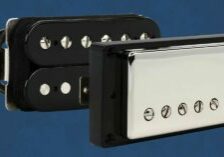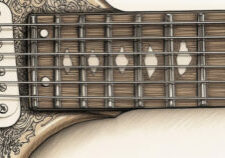Are you tired of feeling stuck in your guitar playing? Do you want to take your skills to the next level? The good news is that there are ways to speed up the process and become a better guitar player faster.
In this article, we’ll explore some ideas for improving your guitar skills, so you can become the guitarist you’ve always wanted to be.
First and foremost, you should know that learning to play guitar takes time and dedication. There is no easy shortcut. However, there are ways to make the process more efficient and enjoyable.
Whether you’re a beginner or an experienced player, these tips can help you take your guitar playing to the next level. So, let’s dive in and find out what is the fastest way to improve at guitar.
Understanding Guitar Theory
Understanding guitar theory is crucial for any serious guitarist, as it allows for greater creativity and versatility in playing. It involves learning about the fundamentals of music, such as scales, chords, and intervals, and how they relate to the fretboard. By understanding these concepts, you can improvise better, write your own music, and play more complex pieces.
This being the case, you do not have to know the entirety of guitar theory to greatly improve your skill. You just need to learn some fundamentals.
Major and Minor Scales
One of the first things you should learn is the major and minor scales. These scales form the foundation of western music and are used in countless songs. By learning them, you can start to understand how melodies and harmonies are constructed.
Music Theory
Music theory can seem overwhelming at first, so take your time and practice regularly. You can find resources online or take lessons with a guitar teacher. Don’t be afraid to ask questions and experiment with different sounds.
The Ideal Practice Schedule
Practicing regularly is like watering a plant, it needs consistent attention to grow and flourish. Setting aside even just a few minutes each day to practice guitar will yield better results than sporadic, longer practice sessions.
Developing a daily practice routine will help you build muscle memory and improve your playing skills over time. When practicing regularly, it’s important to challenge yourself and set achievable goals. Start with small, manageable goals and gradually increase the difficulty as you progress.
Don’t be discouraged if progress seems slow at first, learning guitar takes time and patience. Celebrate small victories along the way and keep pushing yourself to improve.
Consistency is key when it comes to practicing guitar. Even if you can only practice for a short period of time each day, make it a habit to do so. Over time, the cumulative effect of regular practice will result in a noticeable improvement in your playing skills.
So, pick up your guitar, set aside some time each day, and start watering that musical plant!
Learning Songs
Get ready to jam out and impress your friends as we dive into the fun and exciting world of learning songs on the guitar! One of the best ways to improve your skills on the guitar is by learning songs that you love. Not only will this make practice more enjoyable, but it’ll also help you to develop your ear and learn new techniques.
Here are four tips to help you learn songs on the guitar:
- Start with simple songs: Choose songs that have easy chord progressions and simple melodies. This’ll help you build your skills and confidence.
- Use resources: Look up chords and tabs online, watch videos, and listen to recordings of the song to help you learn.
- Practice slowly: Don’t try to play the song at full speed right away. Start by playing slowly and gradually work your way up to the full tempo.
- Break it down: If a certain part of the song is giving you trouble, break it down into smaller sections and practice each section individually. Then, put it all together.
Learning songs on the guitar is a fun and effective way to improve your skills. By starting with simple songs, using resources, practicing slowly, and breaking down difficult parts, you’ll be able to impress your friends and take your guitar playing to the next level. Keep at it, and you’ll be a guitar master in no time!
Setting Goals
Let’s dive into the section on setting goals and discover how to take our guitar playing to the next level by creating a personalized plan for success. Did you know that studies show that people who set specific goals are 10 times more likely to achieve them?
Setting goals is an essential part of improving your guitar playing and staying motivated. Start by setting SMART goals: specific, measurable, achievable, relevant, and time-bound.
1.Make sure that your goals are specific and measurable
For example, instead of setting a goal to ‘improve your guitar skills,’ make it more specific by setting a goal to learn a specific song or technique. This will make it easier to track your progress and stay motivated. Additionally, make sure that your goals are achievable and relevant to your overall guitar-playing goals. Setting a goal to play a complex guitar solo might be too challenging if you’re a beginner.
2.Set a deadline for your goals
This will help you stay accountable and make sure that you’re making progress. Instead of setting a vague deadline, make it specific and achievable. For example, set a goal to learn a new song within the next two weeks.
3.Make sure that you’re regularly reviewing and adjusting your goals
If you find that you’re not making progress, it might be time to adjust your goals or strategies to achieve them.
Utilizing Online Resources
We can easily enhance our guitar-playing skills by utilizing online resources available to us in this section. The internet is a vast and valuable source of information and learning, and it’s no different when it comes to guitar playing. With the right guidance and resources, you can improve your skills and take your playing to the next level.
To make the most of online resources, start by finding reliable sources that offer quality instruction and lessons. There are many websites and apps that offer guitar lessons, ranging from free to paid options. Choose a platform that suits your needs and fits your budget. Once you’ve found a good source, create a consistent practice routine and stick to it. Set goals for yourself and track your progress, and don’t be afraid to ask for help or guidance from other musicians or instructors.
Here are four ways to utilize online resources to enhance your guitar-playing skills:
- Watch instructional videos on YouTube or other platforms to learn new techniques or songs.
- Join online guitar forums or communities to connect with other musicians and learn from their experiences.
- Use guitar apps or software to improve your skills, such as chord dictionaries or metronomes.
- Attend virtual guitar workshops or masterclasses to learn from professional musicians and instructors.
Developing Proper Technique
Developing proper technique is essential for any guitarist looking to enhance their skills and play with precision. One of the most important aspects of proper technique is posture. Make sure you sit up straight and keep your guitar at a comfortable height. This will help you avoid strain and injury, and it will also allow you to play more efficiently.
Another important aspect of technique is hand placement. Make sure your fretting hand is positioned correctly on the neck of the guitar, with your fingers forming a slight curve. Your picking hand should also be positioned properly, with your wrist straight and your fingers hovering over the strings. This will help you play with greater accuracy and speed.
Finally, it’s important to practice proper technique consistently. This means paying attention to your posture and hand placement every time you pick up your guitar. It may feel tedious at first, but over time, proper technique will become second nature, and you’ll be able to play with greater ease and confidence. So take the time to develop good habits now, and you’ll reap the rewards for years to come.
Working with a Teacher
Working with a teacher can greatly enhance your guitar skills and provide personalized guidance to help you reach your full potential as a musician. A teacher can help you develop proper technique, identify areas for improvement, and provide valuable feedback. They can also help you set and achieve goals, and tailor lessons to your individual needs and interests.
Here are some benefits of working with a guitar teacher:
- A teacher can help you avoid bad habits and ensure that you’re using proper technique.
- They can provide guidance on how to practice effectively, so that you can make the most of your practice time.
- A teacher can help you learn new techniques and expand your musical knowledge.
- They can provide motivation and accountability, helping you to stay on track and make progress.
Working with a teacher can be a great way to accelerate your progress on the guitar. Not only can they provide personalized guidance and feedback, but they can also help you stay motivated and on track.
Staying Motivated and Having Fun
Stay pumped and have a blast as you keep on jamming with your guitar, using some gnarly tips to keep you motivated and having a great time!
First off, don’t forget to take breaks when needed. Playing guitar should be a fun experience, not a chore. If you’re feeling frustrated or overwhelmed, step away from your guitar for a bit. Take a walk, do some stretches, or simply clear your mind. When you come back to it, you’ll feel refreshed and ready to keep on playing.
Another great way to stay motivated is to set achievable goals for yourself. Whether it’s learning a new song or mastering a new technique, having a sense of accomplishment will keep you motivated to keep going. Make sure your goals are specific, measurable, and realistic. Write them down and track your progress. Celebrate your achievements, no matter how small they may seem.
Lastly, don’t forget to have fun! Playing guitar is a creative outlet that should bring you joy. Experiment with different genres and styles. Play with other musicians and learn from them. Learn your favorite songs and play them with passion.
When you’re having fun, you’ll be more motivated to keep on practicing and improving. So keep on jamming, and remember to enjoy the ride!
Frequently Asked Questions
How can I improve my finger strength and dexterity for playing guitar?
To improve your finger strength and dexterity for playing guitar, it’s important to focus on exercises that specifically target your fingers. Start by practicing basic finger exercises like finger stretches, finger tapping, and fingerpicking. Gradually increase the difficulty of these exercises as your fingers get stronger.
Additionally, try incorporating finger-strengthening tools like hand grippers or finger weights into your routine. It’s important to be patient and consistent with your practice, as building finger strength and dexterity takes time and effort.
As you progress, you’ll notice a significant improvement in your ability to play complex chords and melodies with ease.
Are there any specific warm-up exercises I should do before practicing guitar?
Before you start practicing guitar, it’s important to warm up your fingers and hands to prevent injury and prepare for the upcoming session.
A great way to do this is through finger exercises, such as trills and chromatic runs, that improve finger strength and dexterity.
Additionally, stretching exercises for your wrists and forearms can help prevent repetitive strain injuries.
Another effective warm-up technique is strumming or picking through chord progressions to get your fingers moving and your mind focused on the music.
Remember, taking the time to warm up properly can make a big difference in the quality of your practice and your overall progress as a guitarist.
How can I overcome performance anxiety when playing in front of others?
If you struggle with performance anxiety when playing guitar in front of others, there are several strategies you can use to overcome it.
First, practice regularly with a plan and gradually increase the difficulty of your repertoire. This will help build your confidence and reduce nerves.
Additionally, try visualization techniques where you imagine yourself performing successfully and confidently. It’s also important to remember that making mistakes is a natural part of the learning process, so don’t let them discourage you.
Finally, consider performing in front of small, supportive audiences like friends or family before moving on to larger crowds. With practice and patience, you can overcome performance anxiety and enjoy playing guitar in any setting.
What are some tips for improvising and soloing on guitar?
Improvising and soloing on guitar can be intimidating, but with practice and patience, you can become a master. Start by learning scales and understanding how to apply them to different chords.
Experiment with different techniques, such as hammer-ons, pull-offs, and slides. Listen to recordings of your favorite guitarists to get inspired and study their solos to learn new ideas.
Practice playing with a backing track or metronome to improve timing and rhythm. Remember, the key to successful improvisation is to let go of fear and trust your instincts.
Keep practicing and experimenting, and soon you’ll be playing incredible solos with ease.
How can I incorporate music theory into my guitar playing without it feeling overwhelming or tedious?
Incorporating music theory into your guitar playing can seem daunting, but it doesn’t have to be. Start by learning basic concepts like scales and chord progressions. Gradually build upon them using resources like online lessons, books, or a knowledgeable teacher. Apply what you’ve learned to songs you’re familiar with, or try writing your own music using the theory you’ve learned.
Remember, consistency is key. Make a plan to practice regularly and stay motivated by setting achievable goals and tracking your progress. With patience and dedication, you can incorporate music theory into your guitar playing and take your skills to the next level.
Conclusion
Congratulations! You’ve made it to the end and that means you’re serious about improving your guitar skills. By implementing the tips we’ve provided, you’re well on your way to becoming a better guitarist.
In fact, if you follow all of our advice, you’ll be shredding like a pro in no time! Of course, we know that becoming a great guitarist isn’t easy. It takes lots of practice, patience, and dedication.
But with the right mindset and the right tools, you can achieve your goals and play the guitar like a rockstar. So keep at it, keep practicing, and don’t forget to have fun along the way!
Remember, the fastest way to improve at guitar is to enjoy the journey.
Good luck!





